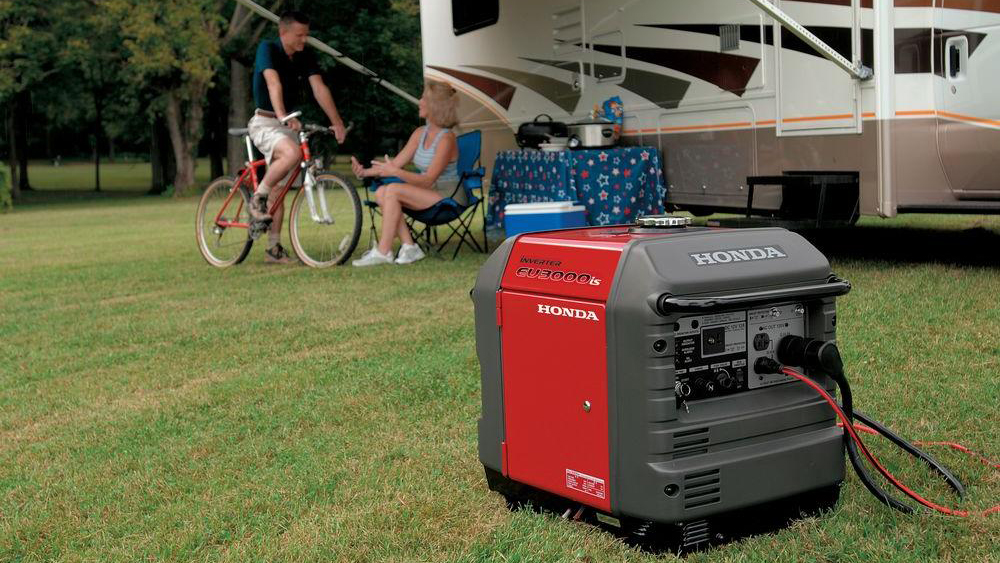Power outages can cause huge issues in your home without one of the best portable generators to keep you going. We've rounded up all of the best portable generators for you to use no matter what the cause, including quiet models, gas, and battery-powered options to suit different needs.
There are many things to consider when shopping for the best portable generators, and first, you'll need to decide which type of power source you'd like. Gas generators will need you to keep topping them up with fuel, but they'll run for as long as you continue to do this. These are noisy though and can have a bad smell, so they might be worth avoiding if you're looking for a quiet generator.
Battery generators, however, are quiet and won't require any fuel, but they do need charging up. If your power outage lasts for a significant period of time, then this could cause issues as it won't provide endless power.
You might also want to think about where you're going to use your portable generator. If you're looking at adding it to your RV or will need to carry it around the house, then it might be best to opt for a lightweight choice.
Powerful portable generators will have an output of around 9,000 watts, making them pretty heavy. If you do decide that you need an easily moveable generator, we'd suggest one of the best portable generators with wheels. Finally, consider the wattage of each generator. Take note of the rating for surge/starting and running wattage of each portable generator. Generally, the higher the rating, the better.
Best portable generators
Why you can trust Top Ten Reviews Our expert reviewers spend hours testing and comparing products and services so you can choose the best for you. Find out more about how we test.
We've rounded up the best portable generators to help you discover the right one for you and your home. While we have reviewed most of the products in this guide, there are some that we might still be getting around to. However, we've summed up user reviews for these portable generators to help you make your purchasing decision.
1. DeWALT DXGNR7000: Best portable generator overall
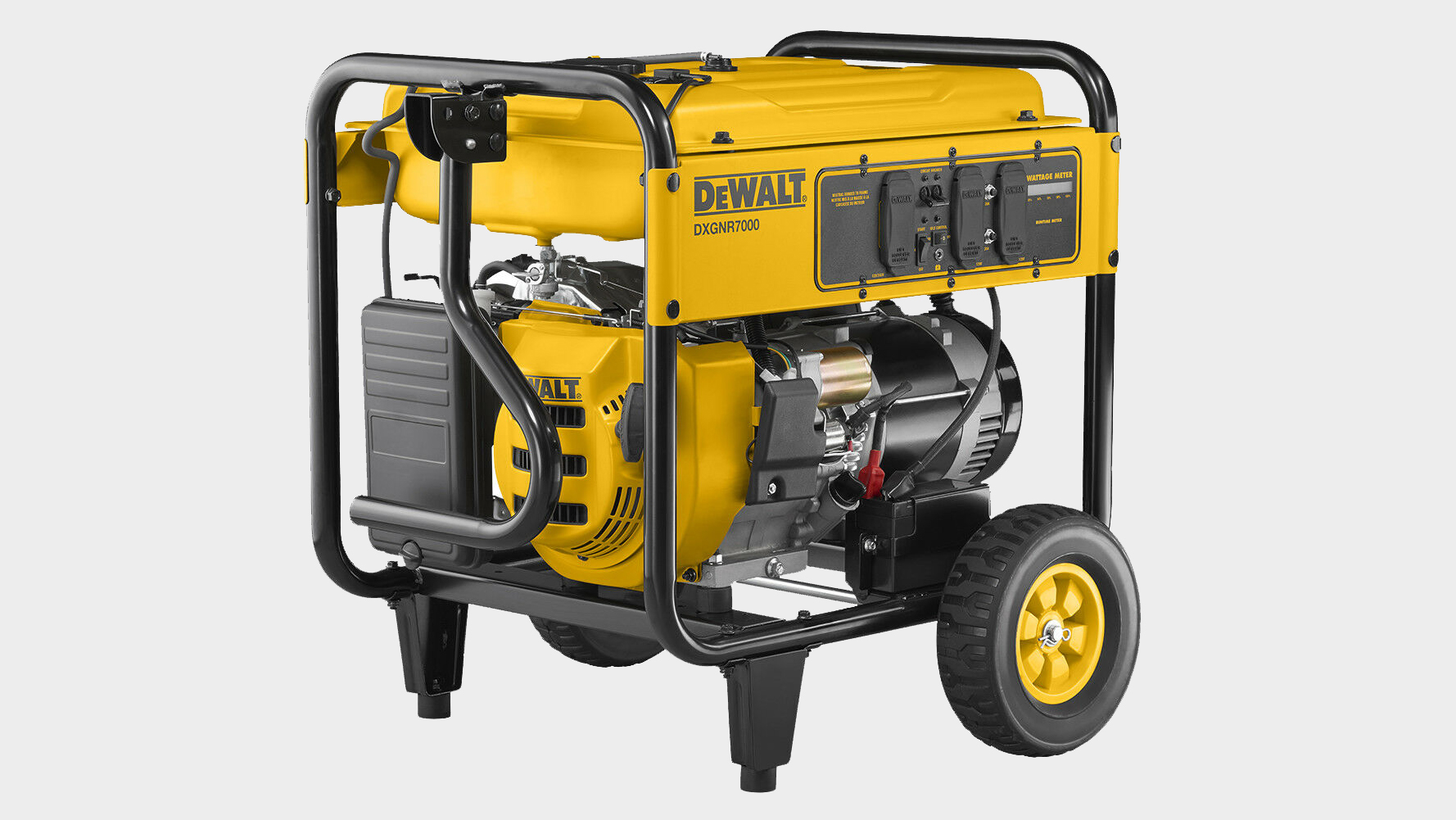
With its steel frame and rugged exterior it’s clear that the DeWALT DXGNR7000 is designed for on site work or as a backup generator when the power goes out, rather than for camping trips or general use around the home. You get four 120 volt power outlets to play with and a whopping 7,000 watts of running power, so you should find it handles most heavy duty equipment. It’s gasoline powered and quite noisy too, but it does have a built-in starter motor so there’s no need to use a pull cord to start it. You should be aware that this isn’t an inverter generator, so don’t get this if you’re looking for something to power sensitive electronics like laptops, tablets or phones.
At 192 lbs, the DeWALT portable generator is one of the heaviest in our line-up, so it might not be the best choice if you know you'll need to move it around. It does, however, have a two wheels on the back and a handle on the front which make it much easier to maneuver.
In terms of maintenance, it should also be relatively simple to stay on top of. Changing the oil, which should be done annually, is very accessible so you don't need to worry about time-consuming maintenance tasks. There's also a small foam air filter that needs to be cleaned, but it's also quick to locate.
Customers seem really pleased overall with the DXGNR7000. Workshop Addict, for example, found the performance of the generator was impressive under load, with the voltage recovering fast when new devices were added. They also had no problem running drills, refrigerators or lights off all four ports simultaneously, which are all power hungry.
What the DeWALT DXGNR7000 lacks in sophistication it makes up for in raw power. One to consider if you’ve got a lot of tools you need to power on a work site.
- Read our DeWALT DXGNR7000 review
2. Ford FG2200iS: Best value portable generator
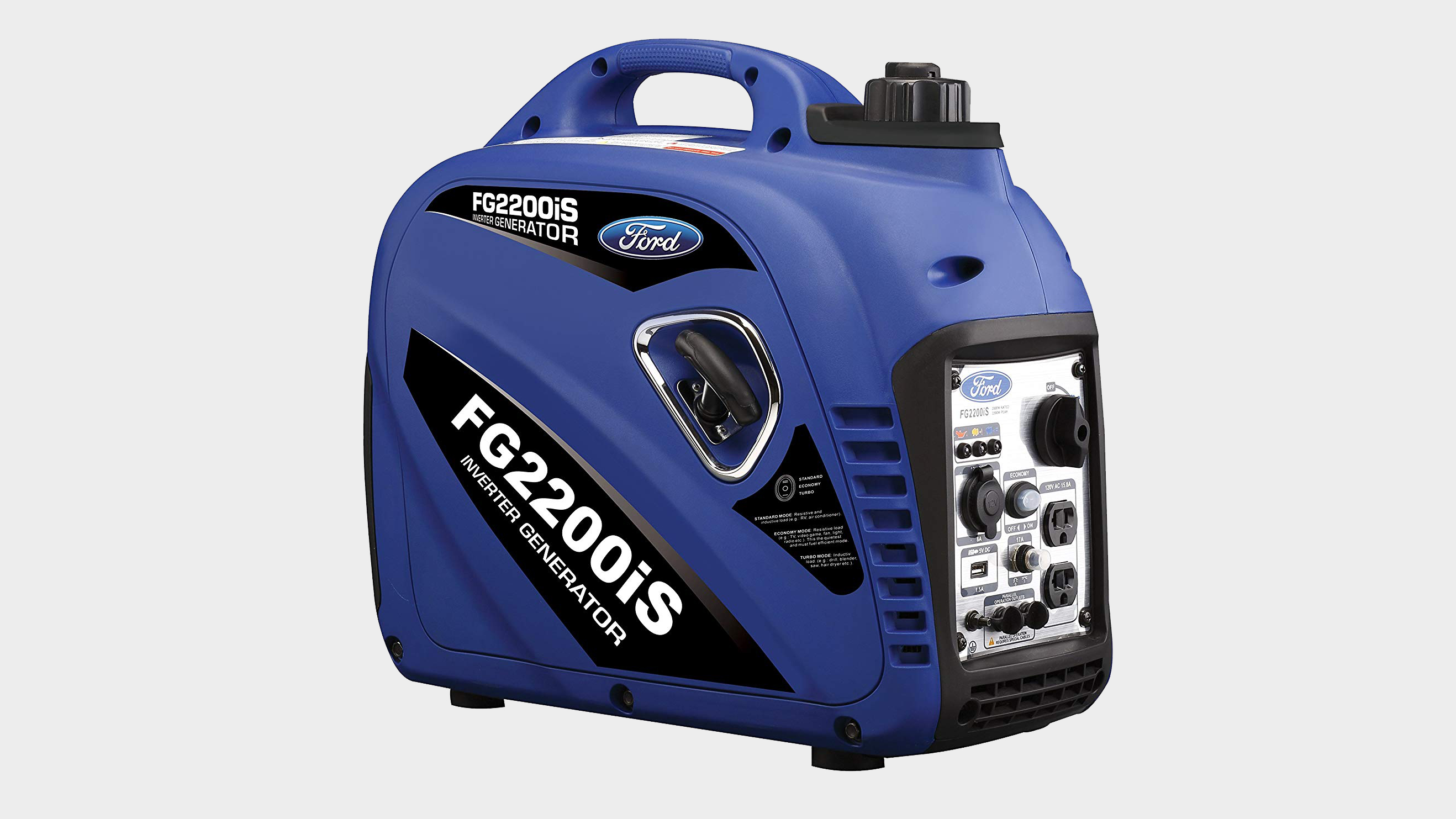
The Ford FG2200iS is a basic but great value inverter generator that will give you 2,000 running watts across two 120 volt power outlets and a USB port.
It’s gasoline powered and needs to be started with a pull cord but it’s a reliable performer and light enough to pick up with one hand. Thanks to an inverter, it delivers a clean sign wave of power so it's suitable for use with sensitive items like a laptop, as well as larger appliances. There's a control panel on the front that gives you all of the functions in one place. Additionally, the on/off and choke settings are all contained in a single dial, which it easier to use. Also built into the unit are a circuit breaker overload and an LED indicator that warn you of any overload or low oil.
Customers really appreciated the light, compact build of the FG2200iS and how quiet it is. The noise level is only slightly higher than a Honda engine, which is great if you're using it regularly for camping trips.
One Amazon customer mentioned that he had to use most of the supplied oil, so you'll have to remember to keep these topped up.
The lack of fuel gauge and the small tank can be a pain and it’s also not as quiet as the Honda EU3000is Handi(opens in new tab), but if you’re looking for a gasoline-powered generator to take on camping trips and you don’t mind a bit of noise then this is the generator you’re looking for.
- Read our Ford FG2200iS review
3. Honda EU3000is Handi: Best portable generator motor
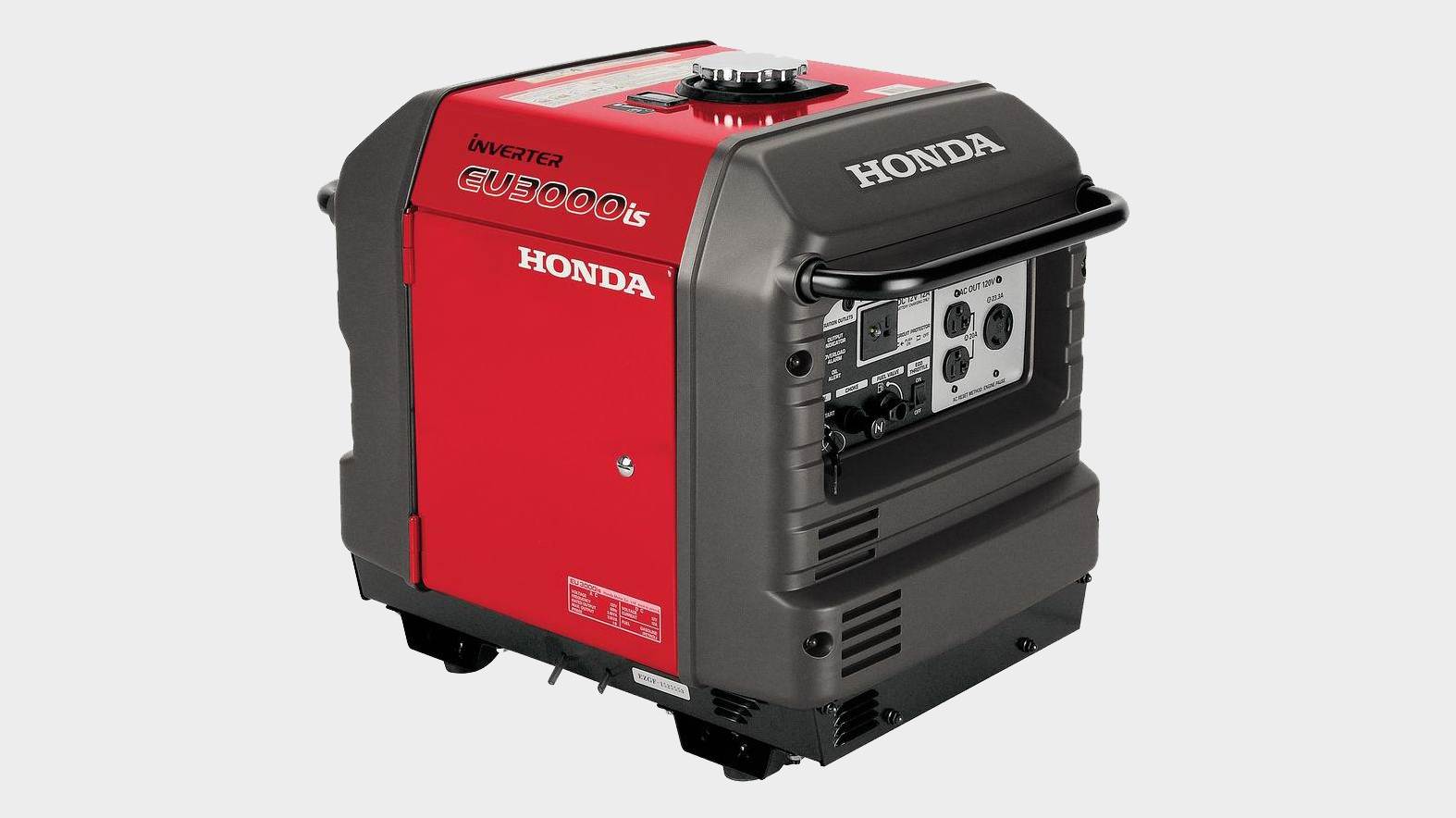
The Honda EU3000is Handi is an inverter generator so you can run sensitive electronics and at 131 lbs it’s light enough to port around. You don't need to start it with a pull cord because it has a starter motor built in.
The EU3000is Handi is very fuel efficient too, considering the amount of power it can output. It can run for 10 hours at 50% load thanks to a 3.4 gallon tank, and with 2,800 running watts of power at your fingertips you can use it for all sorts of devices like air conditioning units, charging your RV and power tools. The built-in inverter also means you'll be able to charge more sensitive electronics like tablets, laptops, and phones. You get two 120 volt power outputs, but sadly no USB ports.
The Honda EU3000is Handi appears quite ordinary when you first look at it. In fact it’s lacking a few features that other generators have. For example, there’s no fuel gauge or USB ports, just two 120 volt power outlets, but it’s what’s inside that matters, and this generator comes with a Honda motor that runs much more quietly than its competitors. The high starting wattage of 3,000 watts means it’s less likely to cut out than other generators when plugged into something power hungry. There’s no electric starter, so you’ll need to pull a cord to get it going. It’s an inverter generator so will work fine with sensitive electronics, it’s just a shame it has such basic features.
Customer's are generally happy with the performance of the Honda EU3000is Handi too, with 179 five-star reviews out of 213 reviews on Home Depot. It seems to run whatever users throw at it, and another plus widely noted is how quiet it is.
- Read our Honda EU3000is review
4. Goal Zero Yeti 400: Best portable generator for home electronics

The Yeti 400 generator is packaged up in a compact box that not only looks great, but is also packed full of surprises. First up, it has a lithium battery, which is much longer lasting than battery-powered generators that use a lead acid battery. It's a lot lighter too, and at just over 17 lbs you can take it anywhere. So if you're wanting to kit out your RV or don't have much space in your garage to store it, you'll be all set.
The Yeti 400 Lithium boasts 3 USB ports and two 120 volt power outlets to give you plenty of options for charging and it’s completely silent in use. Being able to charge via solar power is a big plus, since that’s effectively free energy, however the solar panels are expensive, and you have to use Goal Zero ones.
With 400 running watts you can’t run too many devices at once, but if you simply want to charge multiple home electronics then this is could be the best option for you.
In terms of customer reviews, many users love the build quality, size, and portability of the unit and find it lives up to the stated charging capabilities. One customer noted that the solar panel connector for the Yeti is a Goal Zero one, so it wouldn't work with her existing panels. This is something to consider if you already have panels installed and you're just looking for a portable generator to add to the setup.
- Read our Goal Zero Yeti 400 review
5. RYOBI 18V ONE+ Powersource: Best portable generator for connectivity
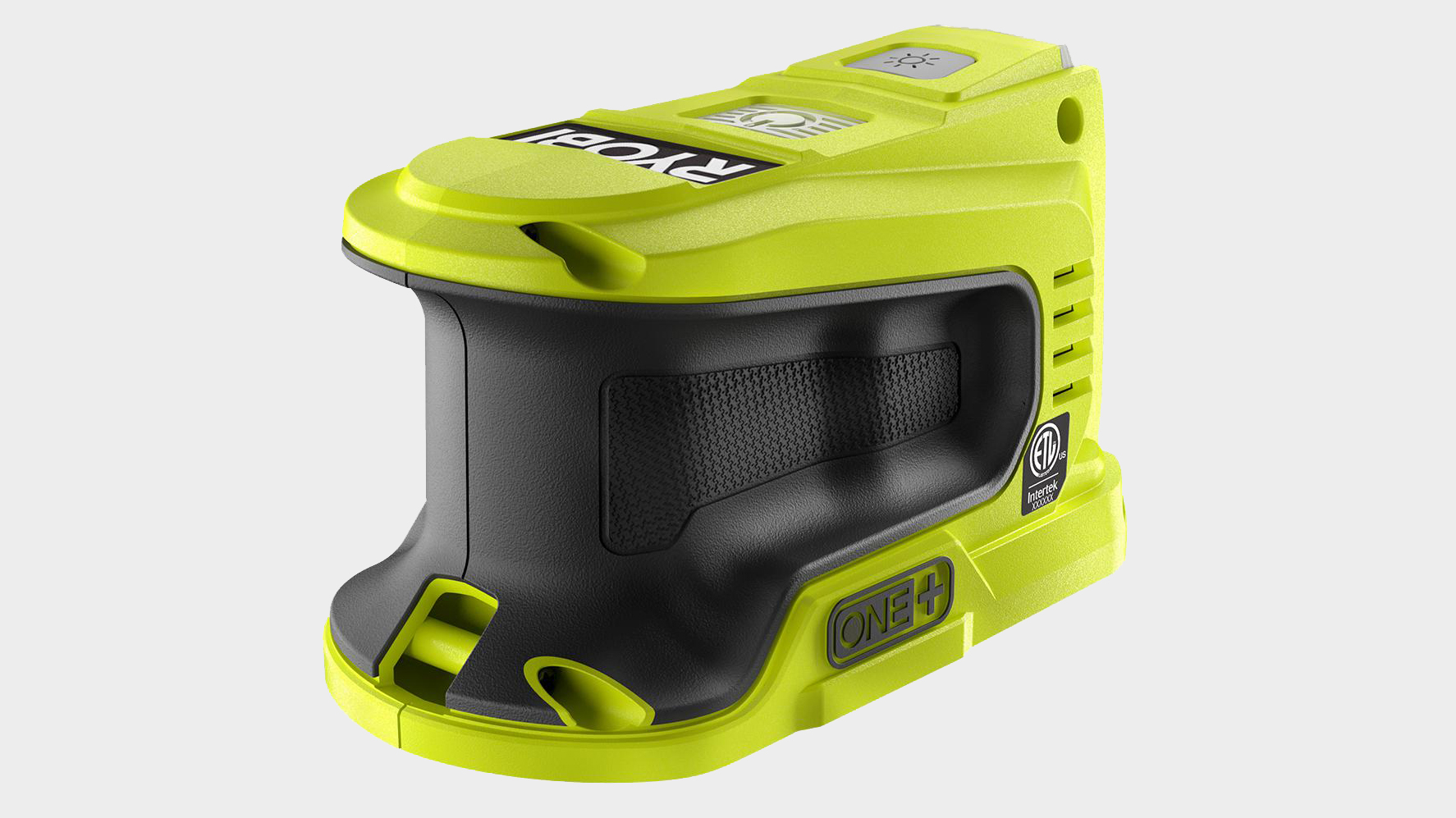
The RYOBI 150-Watt Powered Inverter Generator for 18-Volt Battery is an inverter than connects to any ONE+ battery - which RYOBI also sells. This enables you to plug devices into it directly using the 120 volt power outlet or two USB ports.
It feels unfair to compare the RYOBI 150 inverter to a fully fledged generator like others in this line up. These run from gasoline or propane, and since it has such a small output wattage, it doesn't have the same capabilities. However, if your needs are small then it's definitely one to consider as it's easy to throw into a car and costs a lot less money. This makes it perfect for camping or even charging devices at a tailgate.
Another great feature of this choice is the built-in flashlight. This is especially handy if you're out camping, or using the unit in a dark room. Unfortunately, there's no battery level indicator, and given it doesn't hold a huge amount of power, this isn't very helpful in terms of knowing when it plug it in.
Customer reviews for the RYOBI averages high on Home Depot's website with 4.7 out of 5. Users comment that it's a great way of powering up electronics when camping or if you're out for the day, but it might struggle with anything larger or more important. If you already own other RYOBI products then the good news is that you'll be able to switch over the batteries, so your devices can act as additional batteries across the board. This is a great feature that encourages you to stay loyal to the brand, and if you're after a handy, portable inverter then this just might be an ideal choice.
- Read our RYOBI 18V ONE+ Powersource review
6. Champion Power 75531i: Best portable generator for camping
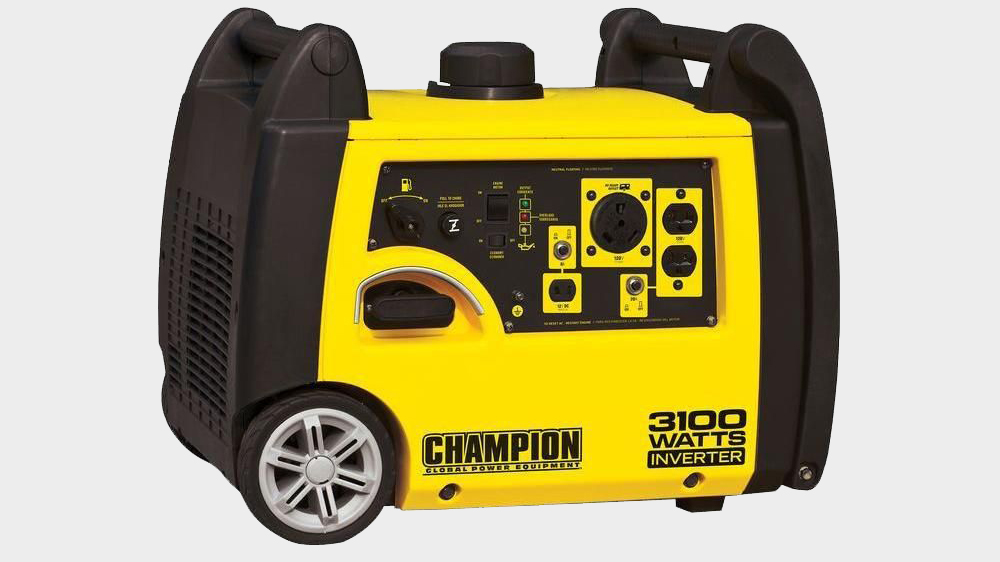
The Champion Power 75531i is a 1.6-gallon gasoline powered model that’s lightweight, portable, and offers enough outlets to keep your devices charged throughout your trip. The fuel tank will last you about either hours on 25 percent which isn't much, so if you're looking to use it consistently over the course of a few days then you might need to bring another generator. Its 171cc engine can generate up to 2,800 running watts, which is more than enough for basic items like small televisions, air compressors and even some power tools. It’s also great at keeping devices like smartphones and tablets charged.
Design-wise, this generator has a really handy handle that extends to the right of the device. On the left-hand side, there are two wheels so you can easily lift it up and pull or push it along.
It's also a relatively quiet portable generator. It puts off about 58 dB of sound which is one of the quietest in our roundup, so it's a great choice for camping as it's unlikely to keep you awake all night.
Another benefit for weekends away is that it has a wireless remote start. The remote control can power up the generator from up to 80 feet away, so if you're returning from a hike or lying in bed, you can start the generator up without having to be physically next to it.
Overall, you shouldn't rely on this generator for large appliances like a refrigerator, but its portable nature means it's a great option for those needing a device to take on the road.
- Read our Champion Power 75531i review
Buying advice for the best portable generators
Portable generators can set you back a fair amount of money, so you want to make sure you're purchasing the right one for your needs. Whether you want a backup for your home in case you face a power outage, or a smaller model for camping trips, there are different features to look out for that will determine your next buy.
Price
Portable generators can range in price - anywhere from below $100 to around $500, depending on the size and power you require. It's important to note that portable generators will cost you to run too, so factor this into how much you want to spend before you invest in a super powerful, expensive model.
Fuel type
We've rounded up a combination of gas-fuelled and battery powered generators in this guide. There isn't necessarily one that's better than the other - it just depends on how much maintenance you want to commit to. Battery generators are quiet and don't require you to continue buying and topping up fuel, but they will need charging up which is difficult if you have a power outage that lasts longer than a day. Gas generators are great if you might face a longer outage, but they do tend to be louder.
Power
Powerful portable generators will have an output of around 9,000 watts, so if you're looking to use it with large appliances then this is what you should be looking out for. Some smaller models only have power outputs of around 150 watts which will be great for charging up electronics if you're camping.
Weight
The higher the power output, the heavier the generator. If you're looking at a powerful generator then you can expect it to be large and weighty. It's important to balance out how much power you need with how easily you need to transport it. If you're looking for a large generator to store in your house for emergencies weight won't be as much of an issue, but if you want to take it on your travels then this is something you'll want to assess.
Can I use a portable generator in the rain?
If your portable generator gets wet, you risk destroying it or worse – hurting someone through electric shock or electrocution. Some portable generators have a GFCI outlet, which automatically shuts the device off if it gets wet. If you think you’ll be working in wet locations, we recommend purchasing a generator that has a GFCI outlet.
While it’s best to avoid using your machine during bad weather, sometimes it can't be helped. If you must use it on a rainy or snowy day, try to keep your generator dry by placing it on a dry, flat surface and covering it. Some companies even sell generator tents, like this Champion Storm Shield. Just make sure you get one that fits your generator. Many of these tent covers connect to your generator in such a way that they can resist strong winds up to 70 miles per hour, so they're good for all types of weather.
Which portable generator wattage is best?
When electronics start up they will use more power than they will while running, which is known as the surge wattage, or starting wattage, before then settling down to down to their running wattage. If the surge wattage is higher than the generator can handle, it will cut out. To calculate what you need, add together the running wattage of all the devices you want to use simultaneously, then add on the single highest starting wattage of all the devices. This will give you a wattage number to look for in a generator.
Portable generators can set you back a fair amount of money, so you want to make sure you're purchasing the right one for your needs. Whether you want a backup for your home in case you face a power outage,
